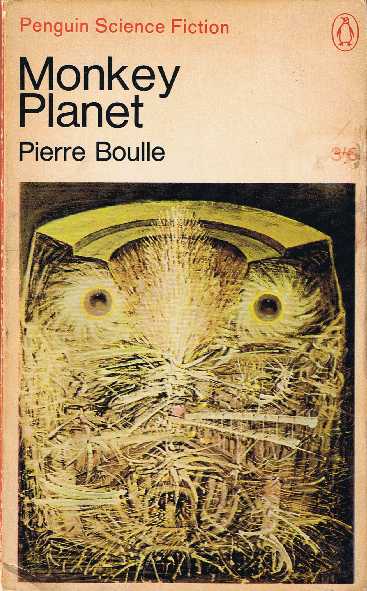Sunday, June 5, 2016
Planet Of The Apes - Monkey Planet!
Pierre Boulle's novel Monkey Planet (aka Planet of the Apes) is a witty science fiction allegory which casts a satirical eye on modern society, especially academia. The story is at once familiar to fans of the Planet of the Apes film franchise and yet very different too.
I've always assumed I'd read this novel before, decades ago. And I've intended to read it again a few times in recent years but always got distracted (small attention span and shiny objects and such don't you know). But I took several hours a while back and read it through and realized that I've never ever read all of it. Glad to finally have that monkey off my back...so to speak.
The novel is framed by an outer space interlude with a young romantic couple who find a manuscript in a bottle in the far reaches of space while sailing through space in an elegant ship which uses light to whip across the vastness. Their true identities are not all that shocking, though perhaps Boulle intended them to be.
They read of a man named Ulysse Merou, a reporter who travels with a scientist and his assistant on an interstellar spaceship to a distant star. They land on an impossible planet very similar in many ways to Earth and find that man is well and truly an animal and that the civilized society is occupied by apes (specifically chimps, orangutans, and gorillas). Not unlike Gulliver in Swift's great satire, Merou tries to cope with the maddening society he finds and slowly succumbs to an altered understanding of how things work and are supposed to work.
For those familiar only with the movies or the comics, there are clear connections with this novel beyond the core concept, and important differences as well. I could readily see how different of the films had picked up details and sequences from the novel and presented them, often in altered form. But the core critique of society remains fairly unchanged across the whole of the Planet of the Apes saga, man is a fool to imagine himself automatically ascendant and his whole society can crash down around his ears very quickly should he refuse to pay attention to his true nature.
If like me you haven't read this one, it's time you did.
Rip Off






I've known about this novel for over 40 years but I finally got around to reading it as an e-book in 2014 (now re-titled as Planet Of The Apes). I hate to nitpick but the apes' planet orbits Betelgeuse which is impossible - Betelgeuse is a red super-giant which only lives for about 10 million years, far too short a time for life to develop - it took at least 600 million years for the most basic single-celled life to emerge on Earth. I only mention this because Pierre Boulle DID understand the far more complicated idea of time dilation whereby only a few months passed on the ship while thousands of years passed back on Earth. Anyway, I enjoyed the novel overall and I was surprised that the characters of Zira, Cornelius, Zaius and Nova had all first appeared before the 1968 film. Setting the story on another planet actually makes more sense than the film version - I mean, did Taylor really have no inkling at all that he was on Earth ? The fact that the apes all spoke English was one clue (which they don't in the novel). The novel has two twist endings - I knew the first one because POTA/Monkey Planet was serialized on BBC radio in 2005 but the second twist (the identity of the couple who find the bottle and who weren't included in the radio version) completely fooled me - I didn't expect that at all !
ReplyDeleteThe English in the movie I chalk up to the conventions of movies, just a necessary to keep it going, though it does raise a valid point. The vegetation, the animals, including the evolved apes all suggest the Earth. The Betelgeuse error I missed, but I have to say I knew the couple were apes from the get-go. The ending which got them back to Earth was a neat twist which the new version (2001 count as new...maybe) does pick up.
DeleteRip Off